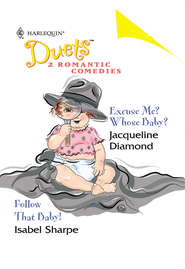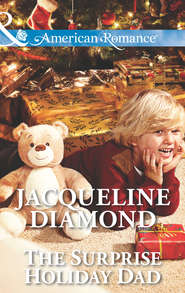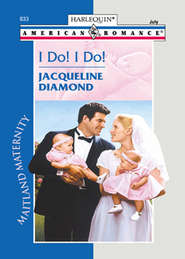По всем вопросам обращайтесь на: info@litportal.ru
(©) 2003-2025.
✖
Diagnosis: Expecting Boss's Baby
Автор
Год написания книги
2018
Настройки чтения
Размер шрифта
Высота строк
Поля
“You’re me all over again,” her mother used to say. But, as a teenager, Natalie had resolved that she would never, never repeat Angie’s mistakes. Three deadbeat husbands, five children and an inability to keep a job had created a chaotic household and made Angie’s kids outsiders at school.
Even when Natalie married an older man at the age of twenty-one, she’d been careful not to get pregnant right away. Her caution had been validated when, over the next three years, her husband, Ralph, began drinking, lost his job and ran up debts. He’d vanished, leaving his wife to pay them off.
She’d been working for a temp agency when she learned about the secretarial opening at Doctors Circle. Patrick’s predecessor, Dr. Grier, had been tyrannical and grumpy, so there’d been frequent turnover in the position.
Knowing she had the right skills, Natalie had sailed into the interview with high hopes. It went well, too. She knew as soon as she met Dr. Grier—nicknamed Dr. Grief by the staff—that she could handle his moods.
Only when she began filling in the application did she discover that she didn’t qualify on purely technical grounds. It seemed unfair and she desperately needed the salary and benefits. So she’d lied, and not just about one thing, either.
She still believed she’d made a wise choice. It was impossible to imagine her life without this job, without the staff at Doctors Circle who’d become like a family, and without Patrick.
Yet she was ashamed, too. Well, the heck with that! Natalie thought in a surge of defiance. Let other people walk a mile in her shoes before they passed judgment.
Restlessly she wandered into her living room, which was dominated by rabbits. There were china rabbits, stuffed rabbits, crocheted rabbits, plastic rabbits and even one rabbit said to be carved out of moon rock, although she doubted it. They crowded the shelves and several end tables.
Her collection had begun at the age of ten when her father gave her his one and only gift: a stuffed rabbit he’d won at a carnival ring toss. Two months later he’d disappeared from her life. Although she’d long ago outgrown her childish belief that the gift proved he loved her, images of rabbits still boosted her spirits.
She desperately needed a boost now. How would Patrick react to the news that he was going to be a father? Would his dark eyes glimmer with anticipation, or would he simply be shocked?
With his strong sense of honor, he’d probably feel obligated to marry her. Maybe, she hoped, he might even be glad for the excuse. But she had too much pride to marry Patrick without admitting what she’d done, and she knew what that would mean.
A few months ago he’d fired a lab technician for lying about his qualifications. He wouldn’t tolerate deception, he’d said. Despite their close relationship, what were the odds he’d give Natalie a break?
If she leveled with him, she’d destroy everything: Patrick’s trust, their future together, maybe even her ability to work for him.
She needed advice. The person to consult, she decided, was her friend Amy Ravenna, a patient counselor at Doctors Circle. Amy had good common sense and, at thirty-three, four more years of experience in life than Natalie did.
Picking up the phone, she dialed Amy’s number. With luck, her friend’s advice would prevent her from making some stupid mistake that might ruin everything.
Chapter Two
“Are those flowers for me?” Patrick’s sister paused in the high-ceilinged foyer to sniff the elaborate arrangement. Her sweatpants and T-shirt were damp where they covered her swimsuit. “I don’t suppose so, since you didn’t know I was coming over.”
Patrick finished knotting his tie in front of the hall mirror. “I’m afraid they aren’t, but I knew you’d be here. You use the pool every Saturday.”
“How’d you figure that out?” Bernie squawked. “Usually I swim and leave without bothering you. I figured you didn’t know I was here.”
“I can see the pool from my bedroom,” Patrick reminded her. “Sis, I enjoy having you over, and the house is yours as much as mine.”
“You bought out my half, remember?” She pushed back a curly strand of brown hair. “Honestly, I’m all grown up and married now. Mike and I have our own house. I just like to borrow the pool.”
“Anytime.” He meant it. Having grown up in the shadow of their older sister’s stillbirth, Patrick had treasured the strong-willed baby who came along when he was four. There’d been times during his teens when he was embarrassed to be seen with his kid sis, but the two had become close over the years.
They’d comforted each other after their father’s death five years ago, and again after their mother succumbed to cancer three years later. Bernie, a natural mother, liked to bring over casseroles, make sure Patrick kept healthy food in the refrigerator and examine the sprawling Barr mansion to make sure his latest housekeeper was properly cleaning the expanses of glass, tile and blond wood.
“So who’s the lucky lady?” Bernie indicated the flowers again.
“Noreen McLanahan called in sick for today’s luncheon.” The event to honor volunteers, of whom Noreen was one of the most prominent, was scheduled for noon at the Serene Beach Yacht Club. “I figured a widow who lives alone could use some cheering up, so I’m going to visit her and give them to her.”
It wasn’t merely a matter of charity. Mrs. Mc-Lanahan, one of the center’s biggest financial supporters and a member of its board of directors, was a peppery personality whose wry observations always kept Patrick laughing. He’d have treasured her even if she was penniless.
“You’ve got a kind heart for a grumpy old bachelor,” Bernie said.
“Gee, thanks.”
To his surprise, his sister wrapped her arms around him. Although tall and athletic, she only came to his shoulders. “Excuse me for being sentimental, but I’m proud of you.”
“For taking flowers to a sick woman?” Patrick teased as Bernie stepped back, her cross-training shoes squeaking on the marble floor. “I must be a real creep most of the time if you’re impressed by this.”
“Yeah, right.” His sister traced a finger along the front table. It came up clean, to her evident satisfaction. The last housekeeper, who’d lasted only six months, had left dust so thick Bernie could write notes in it, and did. “The truth is, you make me feel guilty. I compensate by fussing over you.”
“Guilty? About what?”
“About my choosing to give up medical school to stay home and have kids while you’re shepherding our family’s legacy,” she said.
“You made the best choice for you.” Patrick adored his two young nephews. More than that, his sister’s happy home served as an emotional anchor for him.
“What about your right to make choices? You never wanted to be an administrator, but you stepped up to bat when you saw the clinic falling apart,” Bernie said.
“I just wish I’d done it sooner,” Patrick said.
For as long as he could remember, he’d been fired by a sense of mission inspired by his older sister’s stillbirth. Initially, it had been his motivation for applying to medical school, but later he’d discovered he enjoyed practicing medicine for its own sake.
He’d been so caught up in his pediatric practice that he hadn’t noticed the toll Doctors Circle was taking on his father. Even the Barr fortune, earned from Joe’s invention of self-cleaning window glass, wasn’t enough to underwrite all the center’s charities and compensate for Dr. Grier’s sloppy management. As chairman of the board, Joe had thrown himself into fund-raising with a frenzy, with the result that he dropped dead of a heart attack.
Patrick should have realized that the aging man was pushing himself too hard. He should have given up his practice sooner to take on the administrative job.
He couldn’t turn back the clock. He’d spent five years reorganizing the day-to-day operations and putting the budget on a sound footing, and now he was ensuring the future of Doctors Circle by establishing an Endowment Fund.
“No one could have forced Dad to slow down,” Bernie said. “He was obsessed with the center, even more than Mom was. I know he was upset about their losing a child, but these things happen to lots of people.”
“Dad didn’t see it that way,” Patrick said. “Did you know he blamed himself for Melissa’s death?”
Bernie’s face scrunched in surprise. “No! Why would he do that?”
“While Mom was pregnant, he spent all his time either at his janitorial job or out in the workshop, fiddling with his inventions,” Patrick explained. “He told me that if he’d paid more attention, he’d have seen how she was suffering and insisted on better care.”
“They couldn’t afford it,” Bernie said.
“He’d have borrowed the money if he had to.” Patrick could still see the lines of pain etched in Joe Barr’s face as he’d made this confession. Melissa’s stillbirth had been fresh in the aging man’s memory, even though decades had passed since the unhappy event.
How ironic that Joe had pulled himself out of poverty, gaining a fortune from marketing his self-cleaning glass, yet had never really enjoyed the money. He’d poured much of it into Doctors Circle, which he’d established fifteen years ago. For Patrick’s father, it had been both a form of atonement and a sacred obligation.
“I wish I’d known so I could have set him straight,” Bernie said. “Problems with the placenta can’t always be corrected, even now. Mom never blamed him.”
“I guess when we feel guilty, logic has nothing to do with it,” Patrick said.
“Are you speaking of yourself?” she asked.











